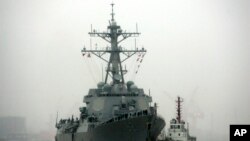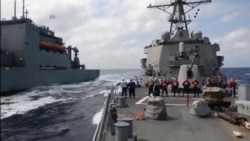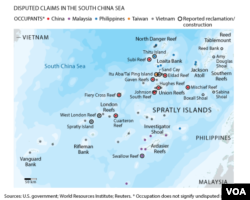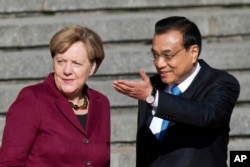China’s Defense Ministry said it will voice its “solemn position” to the United States when top navy officials from both countries hold an hour-long video teleconference Thursday to discuss tensions in the South China Sea and naval ties.
Admiral John Richardson, the U.S. chief of naval operations, and his Chinese counterpart Admiral Wu Shengli will participate in the talks. The two countries have previously held two other video teleconferences.
According to the U.S.-based news website Defense News, a U.S. official said the call on Thursday was not scheduled but the two navies agreed to hold the teleconference “in light of current events.”
Earlier this week, Washington took its biggest step to date to challenge China's claims in the South China Sea, sailing a U.S. navy warship within a 12 nautical mile zone of man made islands in the hotly disputed waters.
WATCH: video clip of US ship in S. China Sea
Beijing, which claims most of the South China Sea as its own, responded angrily calling the trip a “deliberate provocation” and filing a formal protest to the U.S. Ambassador in Beijing.
Chinese defense officials have warned that further forays into territory that it claims as its own may “trigger eventualities.”
Speaking at a regular press briefing on Thursday, Defense Ministry spokesman Yang Yujun commented on the teleconference call and said that China would raise its “solemn position regarding the U.S. vessels entry without permission.”
Yang also urged Washington to not continue to go down what he called the wrong path. “If they do, we will take all necessary measures in accordance with the need," he said.
Online reaction
Online commentaries in the wake of the trip have been heated, with some urging the Chinese military to ram U.S. vessels if they return and others calling for a military response over the dispute. Some have argued that China’s leaders need to be more like Russian President Vladimir Putin in protecting their country’s interests.
But despite the heated reaction online, from officials and in state media, the two countries appear to be continuing efforts to engage and keep the doors of communication open. In addition to the teleconference on Thursday, there are reports that U.S. Pacific Command Commander Admiral Harry Harris and U.S. Pacific Fleet Commander Admiral Scott Swift are planning to visit Beijing in the coming weeks.
The Communist Party-backed newspaper Global Times ran a front-page story Thursday that said Admiral Harris is slated to visit Beijing on Monday, November 2. However, a defense ministry official said Thursday that the two sides are still working on a final date for the visit.
It is not just the U.S. Navy that is increasing its engagement with China. A French frigate is currently on a four-day visit to China’s main South China Sea base in the southern province in Guangdong. And next week, two Australian warships will hold exercises with the Chinese navy in the South China Sea.
Australian media have reported that the exercise will include live-fire drills. And Australian military officials have said there is no sign that China plans to delay or change the schedule for the drills.
Germany's stance
On a visit to Beijing Thursday, German Chancellor Angela Merkel urged China to resolve South China Sea disputes in international courts. Merkel also said that it was important that sea trade routes remain open.
China is unlikely to accept such a view as it has long rejected efforts for international intervention in the disputes. Instead, Beijing favors holding bilateral discussions with other claimants.
More than $5 trillion in trade passes through the South China Sea each year where Vietnam, Brunei, the Philippines and Taiwan also have rival claims.
Some material for this report came from Reuters








